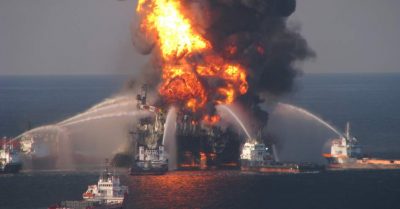Deepwater Horizon Oil Spill Continues to Disrupt Marine Life

Featured image: The Deepwater Horizon oil spill, found to be partially caused by lax safety regulations, killed 11 people and injured 16. (Photo: Florida Sea Grant/Flickr/cc)
Researchers at the University of Southern Mississippi have studied the microbes found on several shipwrecks in the vicinity of the Deepwater Horizon, the oil rig in the Gulf of Mexico that exploded in 2010, killing 11 workers and spewing an estimated 4 million barrels of crude oil into the Gulf. Their research, published June 28 in the journal Scientific Reports, claims the oil residue has caused fundamental changes in those microbes, which play an important role in carbon dioxide absorption by the oceans and are essential building blocks in the food chain for marine life.
“At the sites closest to the spill, biodiversity was flattened,” Leila Hamdan, a microbial ecologist at the University of Southern Mississippi and lead author of the study, tells The Guardian. “There were fewer types of microbes. This is a cold, dark environment and anything you put down there will be longer lasting than oil on a beach in Florida. It’s premature to imagine that all the effects of the spill are over and remediated.”
In fact, that is exactly the story that BP, the owner of the Deepwater Horizon, is spinning.
“Nothing to see here, move along. Nothing to see here, move along.”
Hamdan says the impact the oil has had on microbes could prove even more significant than the loss of tourism due to fouling of beaches along the Gulf coast.
“We rely heavily on the ocean and we could be looking at potential effects to the food supply down the road. Deep sea microbes regulate carbon in the atmosphere and recycle nutrients. I’m concerned there will be larger consequences from this sort of event.”
The new study is especially relevant as the alleged president takes a sledgehammer to environmental regulations put in place by the Obama administration to prevent similar disasters from occurring in the future. On June 19, Trump issued an executive order dismantling virtually all of those regulations. In his usual fashion, he described his action as “rolling back excessive bureaucracy created by the previous administration” and taking the shackles off companies involved with America’s energy security.
The administration has begun to couch everything it does in terms of national security, hoping that by wrapping its desperate agenda to boost fossil fuel companies in the flag, it can divert attention from the outrageous damage its policies will inflict on the environment. It should be intuitively obvious to the most casual observer that tipping the world over into a full scale climate emergency will do more damage to America’s national security than taking reasonable and rational steps to rein in the “business as usual” attitude of oil companies, who think raping and pillaging the Earth is perfectly OK just as long as shareholder value is increased and fat bonuses are paid to company executives. For more on this subject, see Greg Pilast’s searing book, Vultures’ Picnic, which is available in pdf format.
Industry representatives cheered the executive order but conservationists and environmental activists are appalled. Christy Goldfuss, a former environmental adviser to Obama, said Trump is waging an “all-out war on America’s oceans. Trump is trying to wash his hands of responsibility for the real and urgent threats facing America’s coastal communities — namely, the impacts of climate change,” said Goldfuss, who is now at the Center for American Progress.
“In the absence of a president who is willing to lead, it is now more important than ever that coastal governors, tribal leaders, state legislatures, and local communities take up the mantle of leadership and work together to defend and restore the health of America’s oceans.”
The Trumpies are all for state’s rights, except when it means someone in Colorado might smoke a joint, California refuses to turn its police into ICE agents, a woman in Massachusetts wants an abortion, or some state tries to prevent a tourist from Texas walking around with a loaded firearm 1,000 miles from home. Then federal power must be brought to bear in the most heavy-handed way imaginable.
The Trump executive order was created with full knowledge that many states are now controlled by Republican governors and Republican controlled legislatures and that neither will take the risk of offending the fossil fuel companies who are so generous with campaign cash. It’s just another example of how America is now run like a criminal enterprise, with Donald Trump as the capo di tuti capi.
In the overall scheme of things, nobody cares a flying fig leaf about microbes in the Gulf of Mexico or the marine life that ingests them. The study will hardly get a passing notice after today. In the minds of Trump apologists, Nature will take care of itself and nothing humans do could possibly have a lasting effect on the environment. The Earth is here for us to plunder. End of story.
The end of humanity as we know it is exactly what is looming on the horizon, but no one cares, because — you know — Hillary’s e-mails!
*
Steve Hanley writes about the interface between technology and sustainability from his home in Rhode Island and anywhere else the Singularity may take him. His muse is Charles Kuralt — “I see the road ahead is turning. I wonder what’s around the bend?” You can follow him on Google + and on Twitter.

